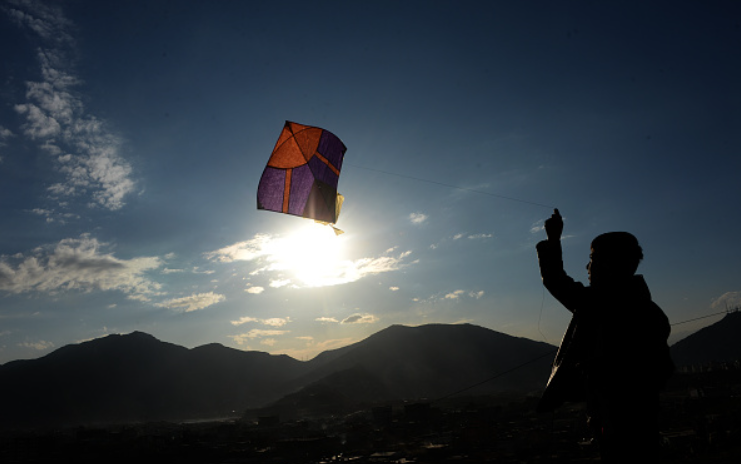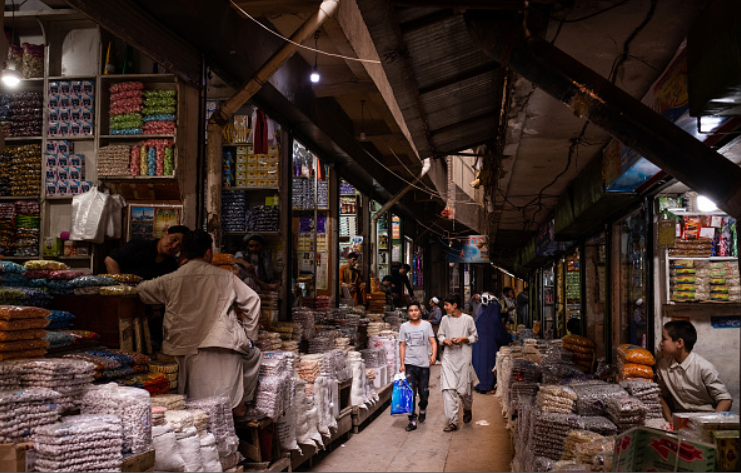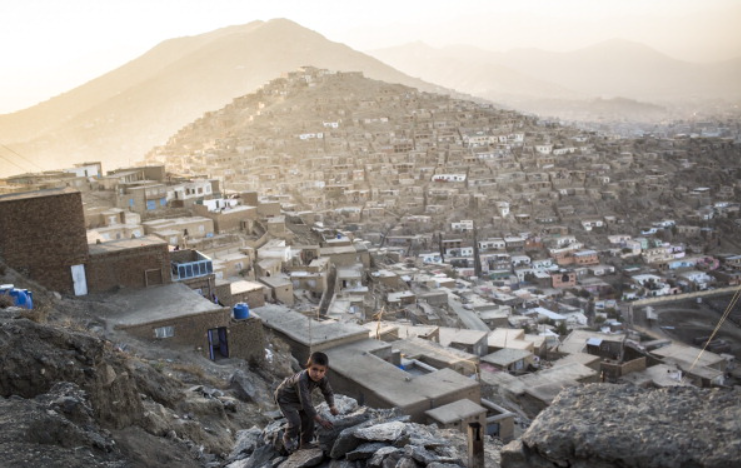
Editor’s Note: Afghanistan is experiencing a critical juncture in its history. The United States has withdrawn from their longest-ever war, the government has withered away, and the Taliban have taken control of most of the country, including Kabul. Tired of conflict and anxious about what the future holds, Afghan citizens find themselves front and center during this flux. As our name implies, at South Asian Voices we care about giving voice to all contributors and a platform for individuals in the region to share experiences. Over the coming weeks, South Asian Voices will publish personal reflections from our friends in and from Afghanistan as they trickle in. Accounting for our contributors’ safety is our foremost priority. Some reflections may be anonymous to protect the contributor’s identity. We hope this initiative reminds readers of who stands to benefit or lose the most from sustained peace or protracted conflict.
Reflections of any length can be sent to: authors@southasianvoices.org. We also welcome audio and visual content.
Kabul Was No Longer Kabul: Was it the Right Thing to Leave?
Hameed Akbar

Shattered and helpless, we stood. Staring out of our living room window in our small apartment, we saw the horror unfold. The dreaded moment had arrived. Kabul had fallen. The President had fled. The Taliban were at the Presidential Palace. Looters were in every neighborhood. All of a sudden, a normally vibrant Kabul evening had become lifeless and horrifying. A heart-rending feeling of loss prevailed. Our country, our world, our home, had collapsed. We had lost Afghanistan. We felt betrayed by our leaders, by the world. Afghanistan had no friends, we anguished. We were on our own, homeless in our own homes. Kabul was no longer Kabul.
That day and night of August 15th and the preceding two weeks had been tormenting. I can never forget the trauma I sensed in the eyes of my fourteen-year-old little sister that evening. Like millions of Afghan children, she was too young for this pain. Many of us had to fake a reassuring smile to console the younger ones, but most of them knew that something terrible had happened.
Fighting and violence had been daily news in Afghanistan for almost two decades. We lived amid fear and hope every day, thinking that hope would triumph and the decades-long, imposed war waged so unjustly on us would come to an end. But it got worse. Within a few days, the whole country collapsed. The speed was unimaginable and a complete shock. We were compromised every day. We were lied to every hour, shamelessly.
I asked myself that evening: who owns Afghanistan now? The answer was clear: not Afghans. Our sense of ownership, our hope, and our understanding of identity had vanished. A damning feeling of not belonging occupied us. That evening, many of us did not feel proud of being members of the international community. For us, the term international community had lost relevance and meaning. We were left at the mercy of a largely unpopular group known for barbaric violence in a predatory neighborhood.
Many of us asked: was it morally wrong to leave? This question will probably keep haunting most of us for the rest of our lives.
In retrospect, for many Afghans, while geopolitics or great-power rivalry might or could have played a significant role in where we were, the selfish, corrupt Afghan political leaders bear more direct responsibility for the demise of the Afghan state. Their hunger for power, political endurance, and unlawful wealth dwarfed the need for a compromise and an acceptable settlement. They were not greater than their narrow interests. They failed us in the first place. Afghans despise them.
In the days that followed the collapse of Kabul, many Afghans who had worked with partner nations or with the former Government and had opted to stay in Afghanistan despite deteriorating security conditions felt left behind. Many had to stop communicating in English with their friends who were checking on them for safety. Young Afghans had to remove photos, videos, personal data, and any traces of so-called affiliation or collaboration. In total dismay, we saw the taking down of the iconic national flag from the famous Wazir Akbar Khan Hill and then within days from all public places and Government offices. Our flag, our army, our freedoms had been taken from us. We were officially stateless.
Many of us found ourselves faced with a moral dilemma. For some of us, leaving the country was an act of betrayal. The decision to leave was one of the most difficult in our lives. But carefully reflecting on some key questions provided some clarity on whether to take the bitter sip of departure.
The options were not many: face retribution and persecution or let go of our dreams and flee. Many of us asked: was it morally wrong to leave? This question will probably keep haunting most of us for the rest of our lives.
What was the alternative to leaving?
In Afghanistan, many Afghans educated at home and abroad never saw themselves as “mere individuals” but as people who had the capacity to make an impact—to change lives. Many were silent victors. They made no noise, but they were changemakers. They had plans. Now, did we want those lives to be wasted and possibly silenced? Were their qualifications, their capacity, of any value in a Taliban-led Afghanistan? Was it moral and reasonable for them to suffer under a regime where only those with known religious affiliations are appreciated and to serve (if allowed) in a Taliban-run Government? Were we going to have a voice and be able to do anything against the oppression? Would our so-called affiliation with the West and the former Government have made us safer or more vulnerable, especially after the Taliban consolidated power? Were we going to be able to reconnect with Afghanistan and be of help?
In Afghanistan, many Afghans educated at home and abroad never saw themselves as “mere individuals” but as people who had the capacity to make an impact – to change lives.
Perhaps we will never find straightforward answers to all these questions. That should never be our intention. We left with heavy hearts. Some of us are becoming refugees for the second or third time in our lives. But this is not the end. We are stronger than our troubles. As a dear friend cogently reflected to me, “the memories will keep coming, for a while. They don’t leave because we tell them to. They slowly fade as we fill our minds with new things more captivating, more compelling, more worthy of our attention. We do not let go from standing in the ruins, but by building our new cities.”
There is a lot that all those who have left can still do for Afghanistan and their new communities. There will be many who will go back when conditions are right. Many will make their new communities proud. For some of us, the path to building new lives remains not fully certain. Most of those evacuated remain confined to military installations in the US or are in third countries waiting for the processing of their applications to be approved for entry into the US and other countries. This leaves them in limbo. They need to be able to start building new lives. The accomplishment of the historic Operation Allies Welcome, a true act of humanity, will be determined by how successfully Afghans are integrated into their new communities.
We cannot allow Afghanistan to become a forgotten corner again. The gains of the past two decades are precious. Morality and self-interest both call for engagement with Afghanistan’s new reality – the Taliban. Afghanistan has had enough of war, for 43 years. No Afghan wants more war. It is our plea to the world to make permanent peace a shared goal. The international community, regional countries, the Afghan Taliban, Afghans at home, and the Afghan diaspora all have a role to end Afghans’ suffering, prevent international terrorism, and mass migration.
The international community must continue to hold the Taliban accountable for their actions; remain engaged with them. We should demand respect for human rights and inclusivity. However, the humanitarian situation is dire. Therefore, political considerations must be decoupled from urgent issues.
The Taliban need to understand that they are ruling a transformed Afghanistan. It is critical for their survival to make the current pause in war permanent. They need to hear that Afghans do not want to be ruled by oppression. The Taliban have no way but to respect the will of the Afghan people. Control does not mean owning Afghanistan. They need to win hearts by being inclusive and accommodating of differences. They will not last long if they oppress. Afghans want to have a normal, dignified country that enjoys the respect of the international community. Afghanistan belongs to all Afghans. The Taliban need to learn from what went wrong with the years-long peace talks. There is no stronger way to encourage international engagement than a clear and demonstrated commitment, in words and deeds, to respect human dignity and provide peace and security to the Afghan people.
Let us hope that Kabul will become Kabul before too long.
Hameed Akbar was a Fulbright scholar at Georgetown University. He specialized in Global Politics and Security. He has served in advisory and policy capacities with the public sector and international organizations. His work focuses on broader stabilization issues, i.e., local governance, peace-building and state-building, economic and social inclusion, and education.
Last modified November 5, 2021.
When We Prioritize Guns over Peace
Arash Yaqin
Arash Yaqin is an Afghan native who fled the Afghan civil war and lived as ex-refugee in Russia and Europe for two decades. In Kabul, he worked as a UN capacity-building advisor for the Afghan Ministry of Foreign Affairs and later for the Afghan Institute for Strategic Studies. This video was filmed on September 1, 2021.
Last modified September 7, 2021.
A Human Tragedy: Receiving Forgiveness Cards for the Guilt of Service to Your Country
Anonymous

As the Taliban have taken control of Afghanistan, the present looks dark and the future looks darker. It took only a couple of days for a regime to collapse, an army to disintegrate, and for society to change entirely. For Afghanistan’s young generation born after 2001, the Taliban’s presence on the streets feels like waking up into a nightmare as one deals with both personal and public grief.
I graduated from a top university in Afghanistan with a bachelor’s degree. It did not come easy as I spent years learning English, passing difficult exams, and spending sleepless nights studying—all with a goal to contribute to myself, my family, and to my country. I looked forward to the days ahead that these efforts had helped put before me, expecting a future where I would be free like any other human being on earth. With the Taliban ruling the country, all I care for now is my own and my family’s survival.
It was a sunny and hot Wednesday afternoon when my brothers and I heard the heavy gunfire as we ate dinner together. We had been discussing the Taliban, but there was no way we could expect the government in Herat to collapse as fast as it did. Everyone started to scramble with fear. After finding out that the Taliban attacked the city, we decided to leave our house for a safer place. On the road, we saw motorbikes and cars crammed full of people and children speeding by. Shops closed and pedestrians were running. It was the first time in my entire life that I left my house to save my life. Our only hope was for our national security and defense forces along with the national resistance forces to fight back. However, they failed to defend the city. The ANDSF were corrupt, but still, we believed in them because they have proven to the people of being capable of defending the country when led appropriately. However, several thousand troops were ordered to surrender with containers full of modern weaponry. Herat fell to the Taliban in a matter of hours, leaving its people filled with shock and dread.
It seemed like not more than two hours before the beautiful three colored flags of the republic changed to white flags of the Taliban. Men armed with American M4s and M16s rode around the city in Humvees and motorbikes with their flags on their vehicles. It was as if zombies attacked the city like they would in the movies. We were still hopeful for support from the air force to get the Taliban out, but they never came. Chaos filled the city as the Taliban moved into government buildings.
As the residents of Herat realized there would be no counterattack, they started to go out into their city. We watched as our city of Behzad, the master of Islamic miniatures, and home of the renowned mystics, Jami and Ansari, and historic cities across Afghanistan fell to the Taliban. Civil servants, police, and army personnel were told to come to receive letters of forgiveness from the Taliban to be secure. Desperate people formed long lines in front of the Taliban fighters to save their families lives and their own.
What I cannot comprehend is what they are guilty of, what it is they must be forgiven for. It is as if service to your country, feeding your family, and living under a republic system is a guilt to bear, one that should be forgiven.
What I cannot comprehend is what they are guilty of, what it is they must be forgiven for. It is as if service to your country, feeding your family, and living under a republic system is a guilt to bear, one that should be forgiven. These were neither ideologues nor were they involved in the government’s decision-making process—they were simply providing services to address peoples’ day-to-day needs.
People are fearful. Fearful of voicing their opinions against the Taliban, and those who served the county as civil servants stay inside to avoid any danger outside their doors. This is an overstep of human dignity. Besides the betrayal of corrupt leaders, one cannot disregard the role of the international community in this tragedy. They legitimized a terrorist group and empowered them. Whether they like it or not, they bear responsibility. Afghanistan is a country betrayed by its leaders, neighbors, and global leaders.
The Taliban have indeed taken control of Afghanistan, but they are illegitimate, undemocratic, and cruel. They cannot represent all Afghans. Neither their culture nor their version of Islam is compatible with that of ordinary Afghans, especially those living in urban areas. The infant republic fell, but its values are alive still. Afghanistan fell because its leaders were corrupt, and it was arranged wrongly from the beginning. The same is true with the Taliban’s emirate. They might rule the country for short or long, but one day they will fall too. Regimes come and go, but it is only the people of Afghanistan, like me and my family whose lives are and continue to be uncertain and are unlikely to change for good in the near future.
Several days have passed since the Taliban’s takeover of Herat. While it is clear most of Herat’s residents detest seeing the Taliban control the city, people are getting out slowly from their houses to feed themselves and their families with despair, anger, and fear. This human tragedy is a step back not only for Afghans but for our world as a whole.
Last modified August 20, 2021.
Afghanistan Is No More
Maidi Askari

Afghanistan is no more. The past few days have seen a monumental political turmoil, which resulted in the fall of Ashraf Ghani’s American-formed government and the coming to power of a Taliban regime. The rate of the fall of the Afghan army shocked the most informed political analysts and the world’s best intelligence service, the CIA. While there are many speculations about the nature of the fall of the Afghan army, and subsequently the government, U.S. President Joe Biden has chosen to place the blame on the Afghan army and—as he has consistently stated—their “will to fight.”
I feel I must share what many reports and videos surfacing on my social media are indicating: an entirely different picture. A video in the Independent Persian on August 17 shows an Afghan soldier resisting his commander’s order. He cries, “I will not surrender, I will not hand over my weapon…even if the entire Afghanistan surrenders, I will not hand over my weapon.” This was not a single phenomenon: many videos have surfaced on social media that indicate similar occurrences where the order from the top was for the soldier to surrender and hand over their military equipment to the Taliban, but many have refused and fought until their dying breath.
Another important episode occurred in Mazar-i-Sharif, which resulted in the surrender of the city and the escape of Marshal Abdur Rashid Dostum and Atta Mohammad Noor, two of the most prominent warlords and commanders of the north. After the fall of Herat, a cultural hub of Afghanistan, and one of the biggest cities in the country, a resistance front reportedly formed with Dostum, Noor, and Mohammad Mohaqiq in Mazar-i-Sharif. These individuals had the capacity, military experience, and “will to fight” to oppose any and all attacks on Mazar-i-Sharif and were planning to initiate an offensive to rid the north of the Taliban entirely. However, after two days, news emerged that Mazar fell to the Taliban as well. This was the last potential resistance to oppose the Taliban and, after the fall of Mazar, it was only a matter of time before Kabul, Ghani’s government, and the entirety of Afghanistan fell. Hope was lost, people started panicking, the atmosphere took a different shape, the country was in shock, and fear crept in. After Noor and Dostum fled, Noor tweeted and wrote on his Facebook page, stating that there had been a conspiracy. Noor wrote that “Despite our firm resistance, sadly, all the government & the #ANDSF [Afghan national security forces] equipment were handed over to the #Taliban as a result of a big organized & cowardly plot. They had orchestrated the plot to trap Marshal Dostum and myself too, but they didn’t succeed.”
Recently, an established Western media outlet, Vice, which specializes in reporting on warzones and areas of conflict throughout the world, published a documentary following an Afghan special force unit in Kandahar as they were fighting against the Taliban. The report showed that as the forces were preparing to fight the Taliban at sunset, they received an order from the top to “leave all the heavy military equipment.” This included hundreds of Humvees, trucks, and tanks, and to leave the compound, as an “agreement” had been reached with the people at the top and the Taliban.
Though they have packaged an image for the consumption of the Western media of a ‘changed’ Taliban, videos and reports are emerging of the repressive nature of the Taliban government just after the second day of their rule.
It is hard for me to agree with what Biden stated—that Afghans did not have the “will” to fight, but the government—that the United States created for the Afghans—ended up selling their people, soldiers, and country at the end. The Afghan people are left at the mercy of a terrorist organization, which is said to rule by fear, intimidation, and violence. Though they have packaged an image for the consumption of the Western media of a “changed” Taliban, videos and reports are emerging of the repressive nature of the Taliban government just after the second day of their rule. On August 18th the Taliban fired on protesters in the city of Jalalabad, further reports have emerged of kidnappings, along with arrests of people in Kabul with a rocket launcher pointed at them. Thus, it feels as though the Biden administration, the Western world, NATO, and the Afghan government have betrayed the Afghan people, leaving them like the lambs at the slaughterhouse.
Maidi Askari is currently finishing his post-graduate studies at SOAS University of London. He is a Hazara member of the Afghan diaspora.
Last modified August 20, 2021.
Editor’s Note: We recognize that the situation on the ground is likely to evolve and that citizen journalism is important for understanding these developments—though difficult to verify. In publishing this series, we hope to represent as many personal perspectives as possible.
***
Image 1 (Featured Image): NOORULLAH SHIRZADA/AFP via Getty Images
Image 2 (Kabul Was No Longer Kabul): Jim Huylebroek/Bloomberg via Getty Images
Image 3 (A Human Tragedy): Aref Karimi/AFP via Getty Images
Image 4 (Afghanistan is No More): Daniel Berehulak/Getty Images


